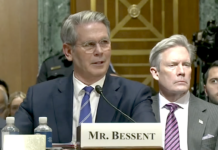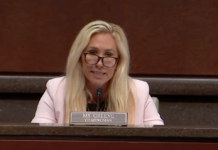
(GA Recorder) — The 21-year-old Woodstock man suspected of gunning down eight people who were mostly Asian women is now charged with murder and has told investigators the shocking violence was not driven by racial animus.
But the brutal slayings Tuesday afternoon have brought a new focus to the rise in hostility toward Asian Americans during the pandemic. Stop AAPI Hate, which tracks violence and harassment against Asian Americans and Pacific Islanders, reported 3,800 “hate incidents” from last March to the end of February. The real number of incidents is likely higher, the group says.
Hate crimes targeting Asian Americans in the country’s largest cities last year jumped 150% even as overall hate crimes declined, according to a report released earlier this year by the Center for the Study of Hate and Extremism at California State University.
State Rep. Bee Nguyen, an Atlanta Democrat, said the increase – which has disproportionately affected Asian American women – can be attributed in part to attempts at blaming China for the COVID-19 pandemic that has upended life and killed more than half-million Americans. President Donald Trump branded the coronavirus as the “China virus.”
But Nguyen said it’s also part of a long history of abuse, including Japanese internment, the Chinese Exclusion Act, and mistreatment of Chinese rail workers.
“We have been taught as Asian Americans to keep our heads down because our parents believed it was safer for us,” Nguyen said. “But what’s happened is that we are now invisible, and when things happen to us, people don’t speak up until a tragedy like this one occurs. Invisibility that hasn’t shielded us from hate crimes and xenophobia or gender-based violence, and we saw all of those intersections happening yesterday.”

The killings, which happened at three spas in metro Atlanta, attracted the attention of the White House, with both President Joe Biden and Vice President Kamala Harris remarking on the shootings. Biden called the recent violence against Asian Americans “very, very troubling” but said he was awaiting more details about the Georgia shooter’s motive.
The suspect, 21-year-old Robert Aaron Long of Woodstock, claimed that he has a sexual addiction and that he targeted the businesses because he saw them as “a temptation for him that he wanted to eliminate,” according to Capt. Jay Baker with the Cherokee County Sheriff’s Office.
Long, who was stopped in Crisp County in south Georgia, told investigators he was on his way to Florida to continue the attack at a business connected to the “porn” industry.
Police officials said Wednesday that it was too early to say whether the killings were racially motivated and whether the state’s new hate crimes law would come into play.
If prosecutors believe the attacks were motivated by the victims’ race, sex, color, or national origin, they could argue for a longer sentence should Long be convicted.
A person convicted of a felony hate crime could serve additional time of at least two years and be forced to pay up to $5,000 in addition to the penalty from the underlying crime.
“It is important to note, the jury determines if a prosecutor has proven the elements of the hate crime statute,” said Pete Skandalakis, executive director of the Prosecuting Attorneys’ Council of Georgia. “The jury must first decide if the defendant is guilty of the underlying crime as charged. If he or she is found guilty, the jury then makes the decision if the crime was committed as a hate crime.”
‘A new chapter in a very old story’
Sen. Sheikh Rahman, a Lawrenceville Democrat who is a Bangladeshi American, urged his colleagues to push back against anti-Asian American sentiments.
“These malicious crimes are taking place in our own backyards,” said Sen. Sheikh Rahman, a Lawrenceville Democrat who is a Bangladeshi American. “We must come together and stand up against xenophobia and any hate crimes committed against Asian Americans or anyone in our communities.
“I’m horrified, outraged and devastated by this violence and deeply concerned for the members of the Asian American community in Georgia and across the country,” he said. “Hate must not have a home in America or anywhere.”

Just one day before the shootings, Sen. Michelle Au, a Johns Creek Democrat who is Chinese American, sounded the alarm about the rise in violence against Asian Americans, calling it “a new chapter in a very old story.”
Au said in a statement Wednesday that it is too soon in the investigation to know what motivated the shootings. But she called on others to reach to Asian Americans in a show of support and solidarity.
“Our AAPI community has been living in fear this past year in the shadow of escalating racial discrimination and attacks,” Au said in a statement Wednesday. “This latest series of murders only heightens that terror.”
The murders were roundly condemned by the state’s leaders. Both legislative chambers held a moment of silence for the victims during Wednesday’s session.
“These horrific crimes have no place in Georgia,” Gov. Brian Kemp, a Republican, said in a tweet. “We look forward to a full accounting of the killer’s deranged actions as law enforcement conducts a thorough, detailed investigation. Every Georgian, including the AAPI community, deserve to be safe and secure in our state.”
House Speaker David Ralston, a Blue Ridge Republican, said, “only evil can walk into a small business and wantonly gun down innocent people.”
“There will be plenty of opportunities to determine motive and all the circumstances surrounding these hideous crimes. Our justice system will work, but today is a day for remembering,” Ralston said.
Aisha Yaqoob, Executive Director, Asian American Advocacy Fund in Georgia, said she hopes the shootings will bring about change.
“We did not see much coverage of anti-Asian violence and anti-Asian discrimination. Our communities knew it had existed,” Yaqoob said. “We had been ringing the alarms and waving the red flags, but this is the first time it’s gotten enough visibility in this way. And so, particularly in Georgia, we are hoping that this will help some of our local and state elected officials really understand what the needs are in our community.”







